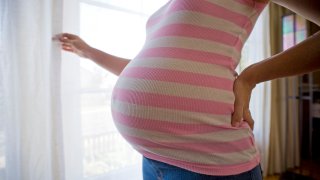
New research out of Northwestern University could be a first step to answering the many questions that persist about how contracting the coronavirus during pregnancy affect mother and baby.
The small study followed 16 women who tested positive for COVID-19 and gave birth between late March and early May at Northwestern's Memorial Hospital in Chicago. Looking at the placenta, it found that these mothers "were significantly more likely" to develop abnormal or injured blood vessels, according to the research published in the American Journal of Clinical Pathology.
That said, all of the full-term babies in the study tested negative for the coronavirus and were doing well when they left the hospital.
Injury to the placenta
"There are specialized arteries on the maternal side that give blood to the placenta, and what we're showing is that there are some problems with the way those vessels are shaped, and then we see injury to those blood vessels," Dr. Jeff Goldstein, a perinatal pathologist at Northwestern Medicine and co-author of the study, told TODAY. "It could cause there to be less blood flow into the placenta, which could conceivably decrease oxygen and nutrient delivery to the fetus."
Fellow study author and obstetrician Dr. Emily Miller added in a statement: “Not to paint a scary picture, but these findings worry me. I don’t want to draw sweeping conclusions from a small study, but this preliminary glimpse into how COVID-19 might cause changes in the placenta carries some pretty significant implications for the health of a pregnancy."
Of the 16 mothers, 15 had live births, all 15 were infected during the third trimester. The remaining mother, who was asymptomatic, had a miscarriage at 16 weeks, but it's unclear if this was related to her COVID-19 diagnosis, Goldstein said. This study did not look at whether the stage of pregnancy during infection plays a role in severity of illness, and that question still remains unanswered.
The 15 mothers who gave birth were either asymptomatic or had relatively mild COVID-19 symptoms. Only two required oxygen, and none were in the ICU, Goldstein added.
Health of the babies, short and long-term
To judge the health of the 15 newborns, researchers recorded their Apgar scores, which use a scale from 0 to 9 to assess a baby's health based on factors like coloring, heart rate, independent movement and crying. The babies all had either an 8 or 9 one minute after birth and a 9 by five minutes after birth.
"The kids seem to have done in the short-term, at least this group of kids, very well," Goldstein said.
Still, Goldstein believes there could be a lifelong impact on these children, but he doesn't know for sure.
"There's been a series of studies looking at people who were in utero during the peak of the 1918 flu pandemic, and those people have higher rates of cardiovascular disease throughout their lives and lower lifelong income," he explained. "What that says is we need to be following up on what's happening with these kids. Until they leave the hospital is not long enough."
Changing prenatal care
Miller said in a statement that the study "does validate the idea that women with COVID should be monitored more closely.” But a spokesperson for the American College of Obstetricians and Gynecologists, Dr. Denise Jamieson, said this research alone is not enough to change the standard of care for moms-to-be.
"We need more information about COVID in pregnancy, all aspects," Jamieson, the chief of gynecology and obstetrics at Emory Healthcare in Atlanta, told TODAY. "Based on these preliminary findings, I don’t have any specific concerns, but I do want to stress that we’ve continually been surprised by the effects of COVID."
Previous research on COVID-19 and pregnancy has attempted to decipher whether the virus can pass through the placenta to the baby, among other topics, but there are few clear-cut answers at this stage. The National Institutes of Health announced earlier this month that it's launching a study that will follow 21,000 women and assess how the pandemic affected their pregnancies.
The takeaway for pregnant women from this study, according to Jamieson, is that it provides another reason to take as many precautions as possible to prevent contracting the coronavirus. These include social distancing, wearing masks and regular hand hygiene.
For now, Goldstein emphasized that the recent research shouldn't prompt rampant "fear."
"If you are someone who's had the coronavirus and recovered or has it and is doing well, this doesn’t mean 'Oh my gosh, you have to get that kid out of there immediately,'" he said.
This story first appeared on TODAY.com. More from TODAY:

